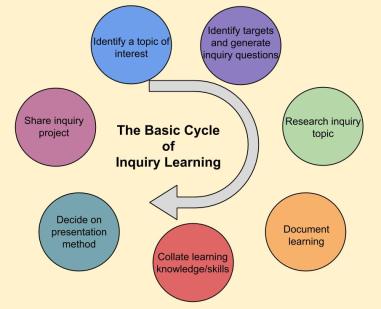As I continue to develop a more robust framework for inquiry learning in my classroom, I have developed a very basic inquiry cycle to guide my instruction.
Before I start my latest reflection on Reintroducing Inquiry Learning Into The Elementary Classroom, I wanted to give a quick shout out to Terri Eichholz and her recent blog post for turning me onto Barry Schwartz and his TED Talk, The Paradox of Choice, which describes the debilitating effect that too much choice can have on our decision making process.
I directly related the negative effects of choice that Schwartz discusses to the difficulty and time it took students to decide the focus of their inquiry. I wrongly assumed they would just figure it out in due course – that deciding wouldn’t be a big deal. I was wrong!
Schwartz says too much choice makes it difficult for people to make a decision and paralysis is a consequence of having too many choices. He also argues that even when we make a decision by overcoming the challenges associated with too much choice, we end up less satisfied with our final choice than we would have if we had fewer options to choose from.
Reasons:
- The more options there are, the easier it is to regret your final decision because it is natural to start to compare the final choice with the original list of choices. This results in a decrease of satisfaction with the product, even if the decision was a good choice. In practice, creating a huge list of inquiry topics with the class may be counterproductive.
- ‘Opportunity costs’ – whenever one chooses to do one thing it is inevitably at the direct cost of another. In inquiry learning, the dilemma of choosing to learn about different animal skeletons means it is not possible to learn about gardening. This causes internal conflict, which can be extremely debilitating for some children.
- ‘Escalation of expectation’ – adding excessive choice to people’s lives increases their expectations about how good those choices are. This produces less satisfaction with final decision, even when it is a good decision. In inquiry learning, student’s expectations surrounding a topic may become over inflated, which leads to an eventual decrease in overall satisfaction.
I plan to counter Schwartz’s findings and help to improve my learner’s chances of self-select an inquiry topic in a timely manner by:
- involving parents more in the process – parents know their children and their passions better than anyone
- model my own inquiry learning
- help my learners narrow their inquiry focus by asking them to think about what they do during unstructured time
How do you help students navigate the decisioning making process around their inquiry projects?

Thanks for the shout out! I love the idea of involving the parents in the process! I’ve done that accidentally (during conferences when students are having a difficult time identifying a topic) but I haven’t made it a formal part of the procedure. Great suggestion!
LikeLike